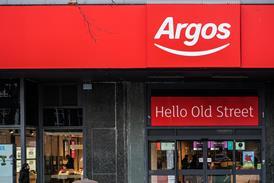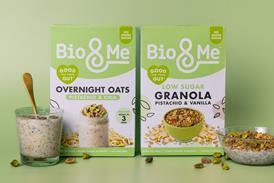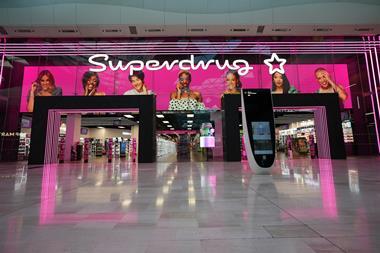Shoppers’ desire to cut food miles and support local suppliers is being supported by vigorous promotional work aided by government funding. Sales show the message is getting through
UK regional foods have received unprecedented exposure since the launch of the annual British Food Fortnight in 2002, which returns this week. More than 8,500 events have since taken place to promote local food.
Sales of regional food and drink in participating outlets during 2004’s fortnight increased by an average of £655 per store, says BFF organiser Alexia Robinson.
The Guild of Fine Food Retailers says sales of British produce made up 73% of the £273.8m market last year. Locally produced food and drink made up £85.5m, other British produce made up £113.3m, while sales of imports account for £75m.
Based on projected turnover growth of the delis and farm shops sampled, British food and drink sales are set to hit £217m this year.
Cheese remains the best performer, taking 25% of turnover. “UK cheese is growing quicker than foreign cheeses,” says Darren Rushmere, sales manager at cheese producer and distributor Longman Cheese Sales. “We’re now educating
people on how extensive the English cheese offer is.”
TNS data supports this. For the year to June 19, British speciality soft cheeses outperformed Continental equivalents by 20%. While Continental Brie grew 2% in value and 2% in volume, British Brie grew 16% in value and 15% in volume.
Regional organisations have helped progress the industry, says Simon Thomas, director at importer Fortun & Moore. “In the past six or seven years the UK market has started to wake up to quality.”
But the key reason for the growth in UK regional produce is government funding for promotion, says Robinson. The three-year programme for British fare, developed with Food from Britain, is intended to improve consumer awareness, trade development and increasing competitiveness. “This has created a real buzz around regional foods.”
The message seems to be getting through. “Customers are continually requesting clear indication of British products,” says Mark Himsworth, deli buyer at Waitrose. All of the hams on Waitrose’s delis are Farm Assured British pork, but are also from its own dedicated supplier. “Establishing this closed supply arrangement was completed last year and has been essential to building customer confidence,” says Himsworth. “We are looking to use local suppliers who add local interest.”
Traceability has also been brought to the forefront in the past year, says Bob Farrand, chief executive of the Guild of Fine Food Retailers, and recent food scares have “created many suspicions in consumers’ minds”.
“They are attempting to reduce food miles and are buying local, reducing additives and other nasties by going to small producers and looking for authenticity.”
UK regional foods have received unprecedented exposure since the launch of the annual British Food Fortnight in 2002, which returns this week. More than 8,500 events have since taken place to promote local food.
Sales of regional food and drink in participating outlets during 2004’s fortnight increased by an average of £655 per store, says BFF organiser Alexia Robinson.
The Guild of Fine Food Retailers says sales of British produce made up 73% of the £273.8m market last year. Locally produced food and drink made up £85.5m, other British produce made up £113.3m, while sales of imports account for £75m.
Based on projected turnover growth of the delis and farm shops sampled, British food and drink sales are set to hit £217m this year.
Cheese remains the best performer, taking 25% of turnover. “UK cheese is growing quicker than foreign cheeses,” says Darren Rushmere, sales manager at cheese producer and distributor Longman Cheese Sales. “We’re now educating
people on how extensive the English cheese offer is.”
TNS data supports this. For the year to June 19, British speciality soft cheeses outperformed Continental equivalents by 20%. While Continental Brie grew 2% in value and 2% in volume, British Brie grew 16% in value and 15% in volume.
Regional organisations have helped progress the industry, says Simon Thomas, director at importer Fortun & Moore. “In the past six or seven years the UK market has started to wake up to quality.”
But the key reason for the growth in UK regional produce is government funding for promotion, says Robinson. The three-year programme for British fare, developed with Food from Britain, is intended to improve consumer awareness, trade development and increasing competitiveness. “This has created a real buzz around regional foods.”
The message seems to be getting through. “Customers are continually requesting clear indication of British products,” says Mark Himsworth, deli buyer at Waitrose. All of the hams on Waitrose’s delis are Farm Assured British pork, but are also from its own dedicated supplier. “Establishing this closed supply arrangement was completed last year and has been essential to building customer confidence,” says Himsworth. “We are looking to use local suppliers who add local interest.”
Traceability has also been brought to the forefront in the past year, says Bob Farrand, chief executive of the Guild of Fine Food Retailers, and recent food scares have “created many suspicions in consumers’ minds”.
“They are attempting to reduce food miles and are buying local, reducing additives and other nasties by going to small producers and looking for authenticity.”














No comments yet